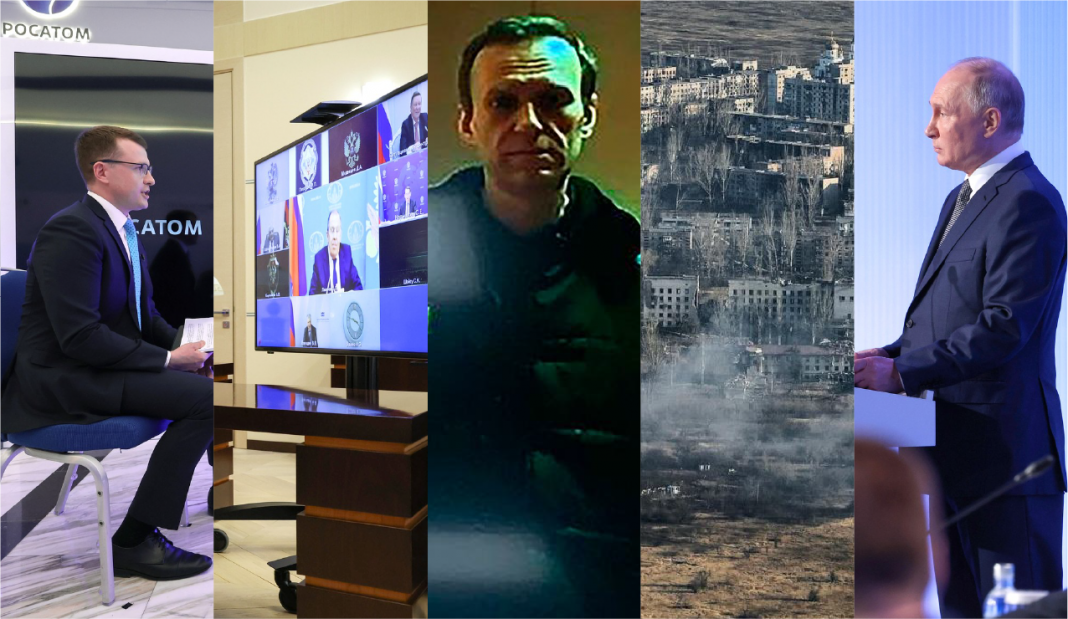This report describes the key events significantly influencing Russia’s political, economic, and social processes.
Assessing the past week’s results, we identify the following trends:
- The appearance of Konstantin Chuychenko at the Security Council of the Russian Federation may indicate a new situational strengthening of Dmitry Medvedev’s group: Chuychenko is a close friend and classmate of Medvedev. The President may be now preparing for some serious legislative initiatives that will require a report from the Minister of Justice. We can also assume that these initiatives will be announced soon during the President’s Address to Parliament. In general, it is worth noting that the meetings of the Security Council have become very frequent, which indicates the presence of a large number of problems that require solutions imperatively and promptly.
- Now, the emphasis is on the fact that Russia has invented a vaccine against cancer (which in the future could become an essential element of global influence, as well as new attempts by the Russian leadership to take a leading position in the global pharmaceutical industry). Suppose statements by Putin and the Direct Investment Fund regarding the development of anti-cancer drugs turn out to be not an election bluff but a reality. In that case, this will lead not only to a geopolitical split in the world but also to a “war of protocols” in which supporters of the “WHO empire” and the “Bill Gates empire” will clash with new protocols and recommendations, which in the foreseeable future will be produced by the countries of the Global South, and this is fraught with a new round of tension (due to the funds that supporters of Western medical schools, who receive excess profits from oncology, are ready to throw at radical solutions to issues) and new wars.
- The interview with Pavel Zarubin was evidence that the previous interview (with Tucker Carlson) was a failure. If the interviewee is forced to clarify what he meant, what he meant to say and what he did not say, then this is evidence of failure. The artificially inflated number of viewers who watched the interview with Carlson (Zarubin speaks of a billion, while the counters showed 250 million) also indicates the insignificant success of the interview, on which a particular bet was made. In terms of meaning, the interview with Zarubin is more critical than the previous one. Putin does not go into lengthy excursions into history, which gave rise to mockery of the earlier material. Instead, he reflects on the new architecture of the world and the relationship between the United States and Russia.
This report highlights the following most relevant for Russia matters, which occurred during 12-18 February:
- Meeting on economic issues;
- Meeting with permanent members of the Security Council;
- Plenary session of the forum of future technologies;
- Interview with Vladimir Putin for “Russia-1”;
- Death of Alexei Navalny;
- Speech by Sergei Lavrov at the Forum “For the Freedom of Nations”;
- Speech by Sergei Lavrov at a conference dedicated to the tenth anniversary of the events in Ukraine.
- Capture of Avdiivka by Russian occupation forces.
This Content Is Only For Subscribers
- Meeting on economic issues
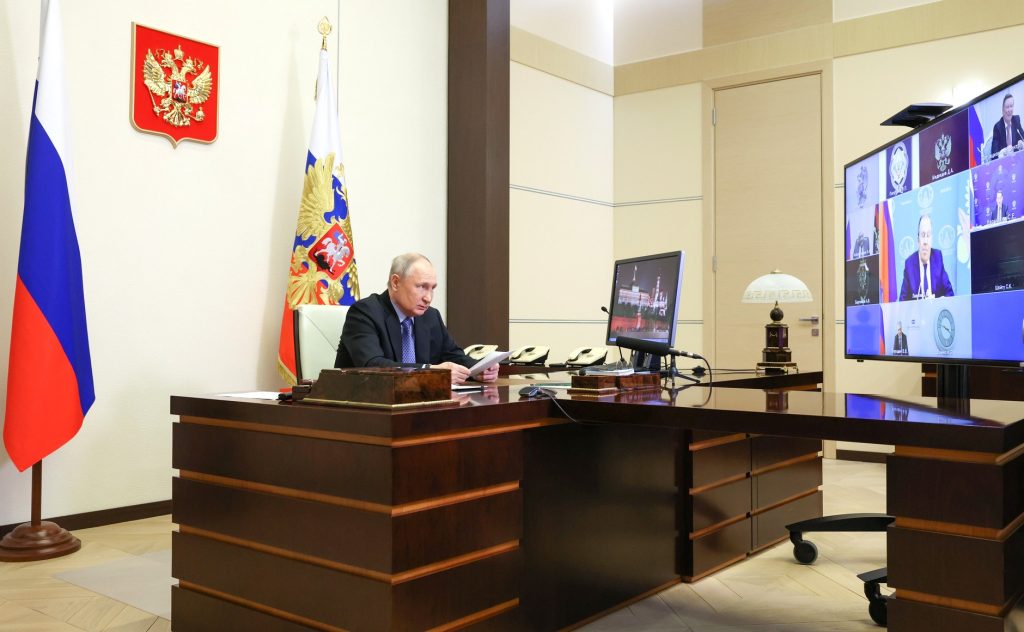
On Monday, February 12, Vladimir Putin held a meeting on economic issues via an online conference. The main topic of the meeting was summing up the leading economic indicators for 2023, as well as discussing possible planning in the future until 2030.
The meeting was attended by Prime Minister Mikhail Mishustin, First Deputy Prime Minister Andrei Belousov, Deputy Prime Minister – Chief of the Government Staff Dmitry Grigorenko, Presidential Aide Maxim Oreshkin, Finance Minister Anton Siluanov and Chairman of the Central Bank Elvira Nabiullina.
Key theses:
- Putin: “Today, as agreed, we will discuss the situation that is developing in the domestic economy: we will discuss the results of last year, current trends in key sectors, and, of course, we will talk about further plans to strengthen the industry, the financial sector, foreign trade and the economy as a whole. Moreover, I propose to dwell both on immediate tasks and work for the future – in the horizon until 2030.”
- Putin: “As I already noted, economic growth last year turned out to be higher than forecast. Russia’s GDP increased, we still believe, by 3.5 percent; according to the latest data – 3.6 percent. This is higher than the global average. The world average growth rate is three percent, and the growth rate of the economies of developed countries is 1.5 percent.”
- Putin: “So, the volume of industrial production over the year increased by 3.5 percent, while manufacturing industries added 7.5 percent.”
- Putin: “For reference: computers and peripherals – plus 32.8 percent, vehicles, primarily aviation equipment, shipbuilding – plus 25.5 percent, furniture – plus 20.7 percent, leather and leather goods – plus 12.3 percent, vehicles, trailers, semi-trailers – plus] 13.6 percent.”
- Putin: “Of course, special attention needs to be paid to inflation and its containment. At the end of January, it amounted to 7.2 percent in annual terms. Of course, we know that at the end of last year, consumer prices increased by 7.4 percent; that is, there has been a decline in inflation. Here, I would like to note the joint actions of the Government and the Bank of Russia.”
Outcomes and outlook:
Throughout the election campaign, Putin will use the theses that the Russian economy has withstood Western sanctions and that the Russian economy has recorded growth in indicators – against the backdrop of a fall in similar indicators in the European Union. That is, Putin will demonstrate that the Russian government has won on the economic front. The fact that the Russian president holds financial meetings in person should signal to the average person that he was at the forefront of victories and achievements. Not Mishustin, not Belousov, not Siluanov, not Oreshkin, but Putin. Therefore, the meeting must be considered in the pre-election outline as an element of creating an agitation and propaganda product.
Another thing is the second half of 2024 and 2025, which should demonstrate the actual state of affairs in the Russian economy. Of course, it is worth recognising that in the short term, economic indicators have shown more stable positions than predicted by Western economists. However, soon, many Russian economists predict a slowdown in the growth of key indicators, after which the expected decline may occur. In this case, it is worth understanding that the active demonstration of “economic victories” is essential only in the run-up to the elections. Further, this information track is unlikely to be in wide demand among the average resident of the country.
- Meeting with permanent members of the Security Council
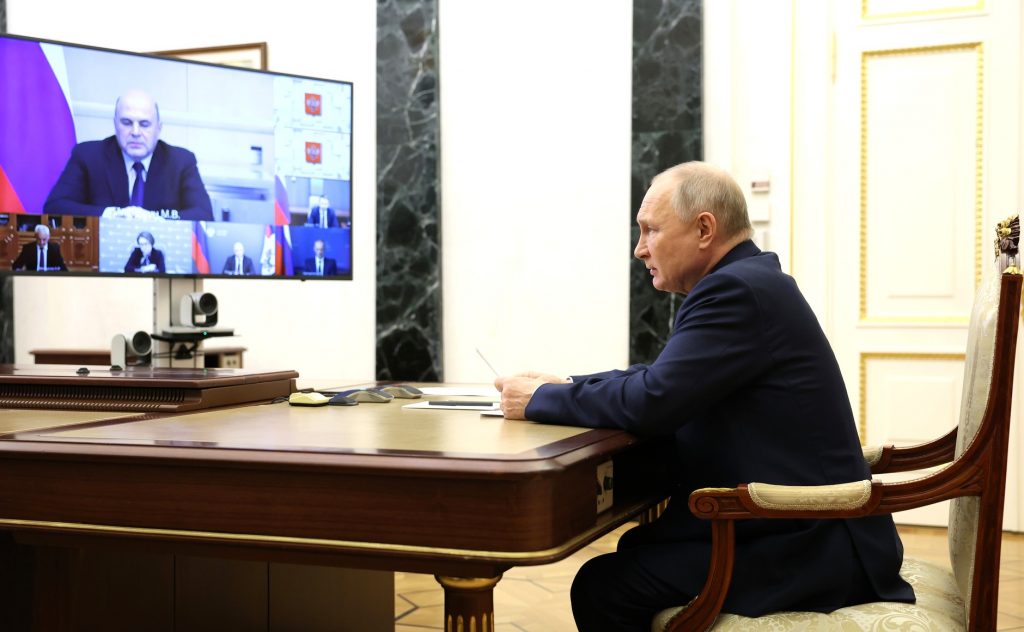
On Tuesday, February 13, Vladimir Putin held an operational meeting with permanent members of the Security Council via an online conference. According to official data, during the meeting, military issues were discussed, as well as the current international situation. At the same time, the main speaker at the meeting was the Minister of Justice Konstantin Chuychenko, who has not recently participated in such meetings.
Also taking part in the meeting were Prime Minister Mikhail Mishustin, Chairman of the State Duma Vyacheslav Volodin, Deputy Chairman of the Security Council Dmitry Medvedev, Head of the Presidential Administration Anton Vaino, Secretary of the Security Council Nikolai Patrushev, Minister of Internal Affairs Vladimir Kolokoltsev, Minister of Foreign Affairs Sergei Lavrov, Minister of Defense Sergei Shoigu, Director of the Federal Security Service Alexander Bortnikov, Director of the Foreign Intelligence Service Sergei Naryshkin, as well as Special Representative of the President on environmental issues, ecology and transport Sergei Ivanov.
Outcomes and outlook:
The appearance of Konstantin Chuychenko at the Security Council of the Russian Federation may indicate a new situational strengthening of Dmitry Medvedev’s group: Chuychenko is a close friend and classmate of Medvedev. The President may be now preparing for some serious legislative initiatives that will require a report from the Minister of Justice. We can also assume that these initiatives will be announced shortly during the President’s Address to Parliament. In general, it is worth noting that the meetings of the Security Council have become very frequent, which indicates the presence of a large number of problems that require solutions imperatively and promptly.
- Plenary session of the Future Technologies Forum
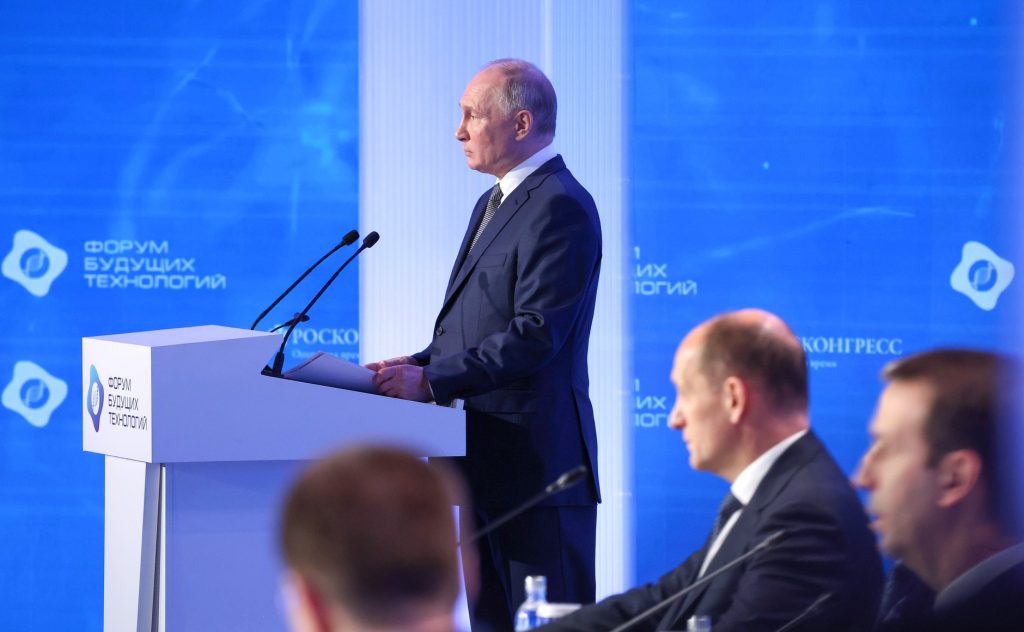
On Wednesday, February 14, Vladimir Putin took part in the plenary session of the Second Forum of Future Technologies “Modern Medical Technologies. Challenges of tomorrow – ahead of time”, which took place at the World Trade Center in Moscow. The Russian President visited the exhibition presented at the forum and also gave a speech in which he spoke about the new scientific achievements of Russian scientists in the field of medicine.
Putin’s key theses:
- “In five years, more than 500 outpatient cancer care centres have been created throughout the country. At the same time, high standards of diagnosis, therapy, and rehabilitation are set throughout the country.”
- “As a result, now more than half of oncological diseases are detected at the initial stage when the prognosis for treatment is as favourable as possible. The volume of chemotherapy increased by 60 per cent, and radiation therapy by more than 25 per cent. Proton therapy has been carried out since 2020.”
- “It is equally important to improve the effectiveness of our efforts in the fight against cardiac, autoimmune and viral diseases. “In particular, by the end of the decade, we need to reduce the incidence of hepatitis C to a minimum. This is what our special program, which we launched last year, is aimed at.”
- “An important issue is modern logistics, especially in remote, hard-to-reach areas. I would like to note that in 2019, we began to restructure the air ambulance seriously. We will, of course, move further in this direction: produce and purchase new equipment (of course, these are still the first steps, but the situation is still developing, and we will continue to work in this direction), as well as build additional helipads, First of all, in medical organisations, develop other necessary infrastructure. The goal is to expand the geography of air ambulance operations further and increase the number of flights. Since 2019, air ambulances have made approximately 57 thousand flights.”
- “And one more decision that concerns all medical workers. From April 1, regions must increase the salary portion of their wages to 50 per cent while maintaining additional payments.”
- “Just now at the exhibition, they showed me the latest developments that are being implemented in our country. I will not list all the institutes, all our companies that work in these areas; here, Rosatom is introducing its latest technologies, the Kurchatov Institute. Oddly enough, companies such as Rosneft, which are not directly related to medicine, nevertheless get involved, say, and invest their available resources in the development of genetic engineering, genetics in general, and so on. A large number of Russian companies under the leadership of the Ministry of Health and the Government of the Russian Federation work for medicine and science, which is in one way or another connected with it. I do not doubt that this will bring serious, noticeable results for our citizens.”
- “I will also add that we have come close to creating so-called onco-vaccines, vaccines against cancer, and immunomodulatory drugs of a new generation. And I hope that soon, they will be effectively used as methods of individual therapy. Of course, there are many exciting discoveries now, and we are looking forward to such discoveries in the future.”
- “In total, 530 Russian medicines were registered in 2023 alone. Thanks to the developments of leading scientists, doctors and specialists, the production of many types of domestic equipment for cardiovascular surgery, as well as for resuscitation, rehabilitation, and diagnosis of genetic diseases, began for the first time.”
- “Finally, another solution designed to ensure reliable protection of intellectual rights of leading medical centres and research institutes that create unique technologies. I believe that when transferring intellectual rights to manufacturers, that is, commercialising breakthrough scientific solutions, research teams should receive a decent remuneration, the so-called royalty. The amount of such payments should be calculated according to clear rules and a unified methodology.”
- “In this regard, I consider it possible and ask the Government to form and ensure the launch of another national project, ensuring technological sovereignty, to develop modern health-saving technologies by the end of this year. It is imperative to identify sources of financing and the required volumes of financial resources for its implementation.”
Outcomes and outlook:
Putin strives to demonstrate his progress by participating in several legislative forums, exhibitions and other events. In contrast to scientific and technical developments, which are supervised by the Kovalchuk group and the Chemezov group – irreconcilable competitors who still had to find some kind of compromise during the election period, the sphere of medical technologies is under the control of Putin’s daughter Ekaterina Tikhonova and “family friend” Kirill Dmitriev, chairman of the Russian private equity fund. It was this foundation that was involved in the development of vaccines against coronavirus and the design of geroprotectors – drugs that slow down ageing.
Now, the emphasis is on the fact that Russia has invented a vaccine against cancer (which in the future could become a very important element of global influence, as well as new attempts by the Russian leadership to take a leading position in the global pharmaceutical industry). Suppose statements by Putin and the Direct Investment Fund regarding the development of anti-cancer drugs turn out to be not an election bluff but a reality. In that case, this will lead not only to a geopolitical split in the world but also to a “war of protocols” in which supporters of the “WHO empire” and the “Bill Gates empire” will clash with new protocols and recommendations, which in the foreseeable future will be produced by the countries of the Global South, and this is fraught with a new round of tension (due to the funds that supporters of Western medical schools, who receive excess profits from oncology, are ready to throw at radical solutions to issues) and new wars.
By declaring that Russia has received a vaccine against cancer, Putin is posing a new challenge to Western corporations and preparing for a more serious confrontation with the West. It is expected that this will not be the last event designed to emphasise Putin’s progressiveness, his concern for scientific and technological progress, and the development of science in Russia in general.
- Interview with Vladimir Putin for “Russia-1”
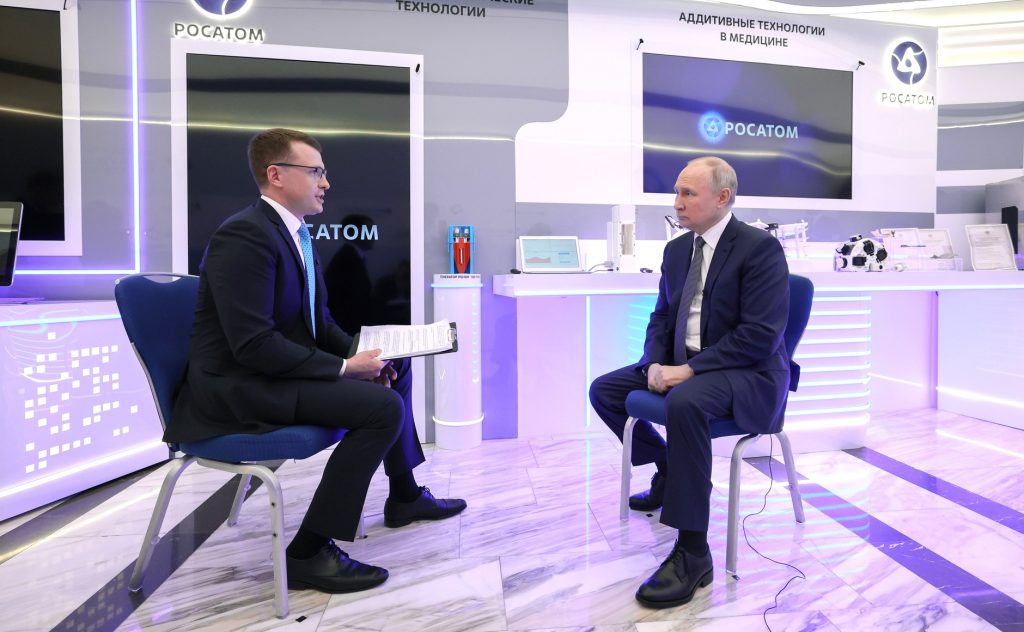
On Wednesday, February 14, after participating in “Modern Medical Technologies. Challenges of tomorrow – ahead of time,” the Second Future Technologies Forum, Vladimir Putin gave an interview to Rossiya-1 journalist Pavel Zarubin. In particular, the Russian president commented on a previously published interview with American journalist Tucker Carlson, and also answered a number of other questions.
Key theses:
- “First of all, it’s good that they [American viewers] are watching and listening to what I say. If today, for some reason related to them, we are unable to conduct a direct dialogue, then we should be grateful to Mr. Carlson for the fact that we can do this through him as an intermediary. So what they watch and listen to is good.”
- “But the fact that they distort what I said is bad, and distort the map. Why? Because I didn’t say anything like that. I did not say that the start of our special military operation in Ukraine is connected with the threat of a NATO attack on Russia. Where is this in my interview? There is a recording; let them show where exactly I said this.”
- “I was talking about something else; I was talking about the fact that we were constantly deceived from the point of view of NATO’s non-expansion to the east. By the way, this was said primarily through the mouth of the then Secretary General of NATO, and he was a representative of the Federal Republic of Germany. It was he who said: not an inch to the east. Then five extensions and a complete deception. We, of course, were and are concerned about the possibility of Ukraine being drawn into NATO, since this threatens our security. That’s what I said.”
- “But the immediate trigger was the complete refusal of today’s Ukrainian authorities to implement the Minsk agreements and the incessant attacks with numerous casualties on the [self-proclaimed] “republics” of Donbass, unrecognised by us for eight years – “LDPR”, which eventually turned to us with a request for recognition, seeing the futility of resolving issues within the framework of the Minsk agreements. We recognised them, then concluded a well-known treaty of friendship and mutual assistance with them and, under the Charter of the United Nations, fulfilled our obligations under this treaty.”
- “As I said, we didn’t start the war; we’re only trying to stop it. In the first stage, we tried to do this through peaceful means – through the Minsk agreements. As it turned out later, we were led by the nose here, too, because both the former Chancellor of Germany and the former President of France admitted and directly publicly stated that they did not intend to fulfil these agreements of ours but were simply gaining time to further pump up weapons to the Ukrainian regime, which they successfully did. We can only regret that we did not begin our active actions earlier, believing that we were dealing with decent people.”
- “For example, Mr. Blinken’s great-grandfather actually left the Russian Empire. He was born, in my opinion, somewhere in the Poltava province, and then lived and left Kyiv. The question arises: does Mr. Blinken believe this is primordially Russian territory, Kyiv and the surrounding areas? First”.
- “Secondly, if he says that he fled Russia from Jewish pogroms, then at a minimum, I want to emphasise this: he believes that there was no Ukraine in 1904, namely in 1904, Mr. Blinken’s great-great-grandfather left Kiev for the United States, it means there was no Ukraine there if he says that he fled Russia. Apparently, Mr. Blinken is our man. It’s just in vain that he makes such public statements. This can lead to failure.”
- “People like the German Foreign Minister, of course – she in this case – are hostile towards our country, towards Russia. But, in my opinion, she is also hostile to her own country, because it is difficult to imagine that a politician of such rank would treat the economic interests of his country, his people with such disdain. I won’t go into details and details now, but in practice, this is exactly what happens; this is what we see.”
- “Trump has always been called a non-systemic politician. He has his own views on how the United States should develop relations with its allies. And it sparked before. Take the withdrawal of the United States from the Kyoto agreements in the field of ecology – then it also sparked. But the then President of the United States decided that the United States would withdraw from these agreements, despite the attractiveness of the environmental agenda, because he believed that this was harmful to the American economy. That’s all. I made a strong-willed decision, and that was the end of it. And no matter how European leaders scolded him, he did it. Yes, I adjusted it later.”
- “I think that NATO is of no use at all; it makes no sense. There is only one meaning – it is an instrument of US foreign policy. But if the United States believes that it does not need this tool, that is its decision.”
- “I think that the domestic political campaign, the election campaign, is gaining momentum in the United States. It takes on more and more acute forms. And it is incorrect, in my opinion, for us to interfere in this process.”
- “Biden [is better for Russia than Trump]. He is a more experienced person, he is predictable, he is a politician of the old formation. But we will work with any US leader who the American people have confidence in.”
Outcomes and outlook:
The interview with Pavel Zarubin was evidence that the previous interview (with Tucker Carlson) was a failure. If the interviewee is forced to clarify what he meant, what he meant to say and what he did not say, then this is evidence of failure. The artificially inflated number of viewers who watched the interview with Carlson (Zarubin speaks of a billion, while the counters showed 250 million) also indicates the insignificant success of the interview, on which a special bet was made. In terms of meaning, the interview with Zarubin is more critical than the previous one. Putin does not go into lengthy excursions into history, which gave rise to ridicule of the earlier publication. Instead, he reflects on the new architecture of the world, on the relationship between the United States and Russia.
For the first time, the thesis was voiced that for Russia “Biden is preferable to Trump,” which from the point of view of political logic is indeed true, but was actively disputed by the world media and analysts, who were confident that Russia was betting on Trump. In terms of content, this interview is not intended for the general public, but is precisely addressed to specific recipients in Washington and European capitals.
- Death of Alexei Navalny
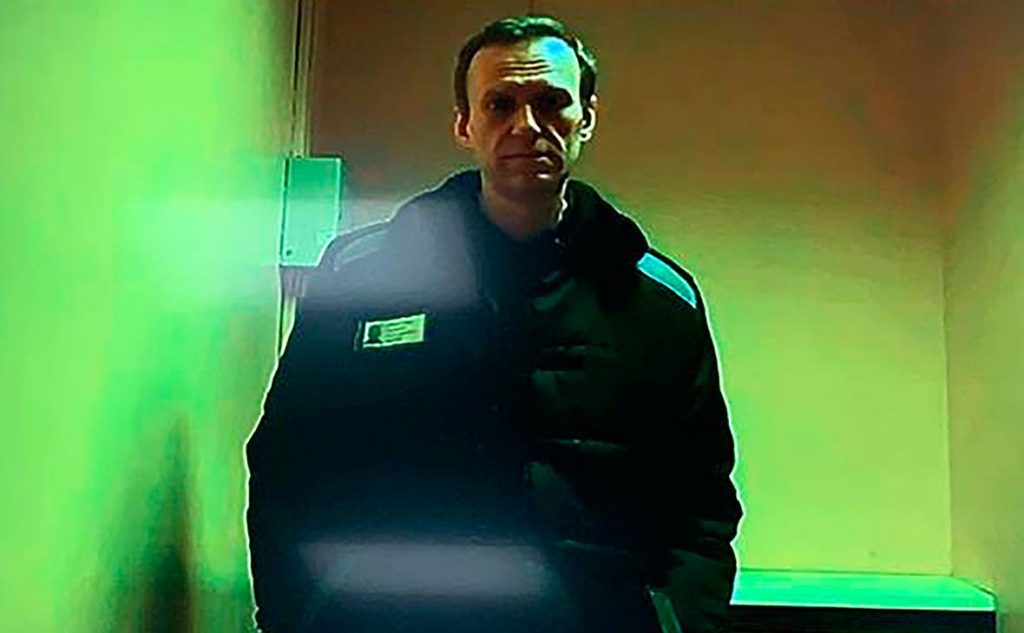
On Friday, February 16, the Russian Federal Penitentiary Service for the Yamalo-Nenets Autonomous Okrug reported that Russian opposition leader Alexei Navalny died in correctional colony No. 3 in the village of Kharp in the Yamalo-Nenets Autonomous Okrug.
“The convicted Navalny A.A. felt bad after the walk, almost immediately losing consciousness. Medical workers from the institution arrived immediately, and an emergency medical team was called. All required resuscitation measures were carried out but did not yield positive results. Emergency doctors confirmed the death of the convict,” the statement says.
The unofficial version of death, which is most often mentioned in the media, is a detached blood clot. However, at the time of publication of this digest, the results of the investigative team had not been published.
At the same time, the death of Alexei Navalny caused a broad resonance among Western politicians. In particular, most of them blamed Vladimir Putin personally for the death. Also, speaking at the Munich Security Conference, which opened on the same day, Alexei Navalny’s wife, Yulia Navalnaya, called on all leaders of the free world to unite and defeat “this evil, this terrifying regime that is now in Russia.”
Outcomes and outlook:
The sudden death of one of the Russian oppositionists, Alexei Navalny, who was serving a lengthy prison term in prison, became an important event for the West, but at the same time did not have the proper resonance in Russia itself. The people did not take to the streets or organise protests, and the government did not shake. Navalny himself was a controversial person. Starting as a nationalist and imperialist, he gradually moved into the category of “fighters against corruption” and tried to run for mayor of Moscow in 2013 (received the support of 27.2% of voters). He was a “black sheep” within the opposition – Khodorkovsky, Ponomarev, Kasparov, and others tried to ignore him and often criticised Navalny’s proposals.
In the mid-1990s, people in Moscow said that Navalny was controlled by certain influence groups surrounded by Putin and called him “a messenger for transmitting signals from one Kremlin tower to another.” Around 2018–2019, Navalny came under the influence of British intelligence services, which tried to use him as an instrument of influence on Russian politics. Navalny’s poisoning, his treatment in Germany, and then the decision to return to Russia – knowing that he faces prison – raise a lot of questions. By that time, he was not a particularly popular figure in Russia. His political rating was 3.62% (according to Levada Center). Attempts by his supporters to organise protests failed.
Gradually, Navalny ceased to be a figure of influence. His wife participates in many international forums, exploiting her husband’s name. It is unlikely that Navalny’s death will undermine Putin’s position or lead to problems for the current government. But the topic of the death of an oppositionist can be used by Western countries for a new round of pressure on Russia. Moreover, the topic itself can be two-stage: for example, after the first shock associated with Navalny’s death, after 2-3 weeks, the topic of “evidence of poisoning of a politician” collected by “independent experts based on the tissues obtained” can be launched. After this, the United States will most likely begin to promote again the message that “Russia is an evil empire,” mention the “Navalny incident” at all platforms and negotiations, and everywhere use the moral argument “How can you cooperate with Russia, which ruined Navalny?” addressing Saudi Arabia, India, China, United Arab Emirates, and other states.
This topic can also be used in domestic political scenarios in the United States – “Trump wants to negotiate with Navalny’s killers,” “Trump wants to improve relations with Russia at a time when it is killing opponents of the regime,” and so on. Navalny’s death will have a long-lasting informational nature and be used in political battles and discussions (throughout this year). But India’s claim that Navalny’s death will not affect trade and economic relations with Russia is partly confusing – as is the medical examiner’s refusal to release Navalny’s body and keeping his whereabouts secret.
- Speech by Sergei Lavrov at the “For the Freedom of Nations!” Forum
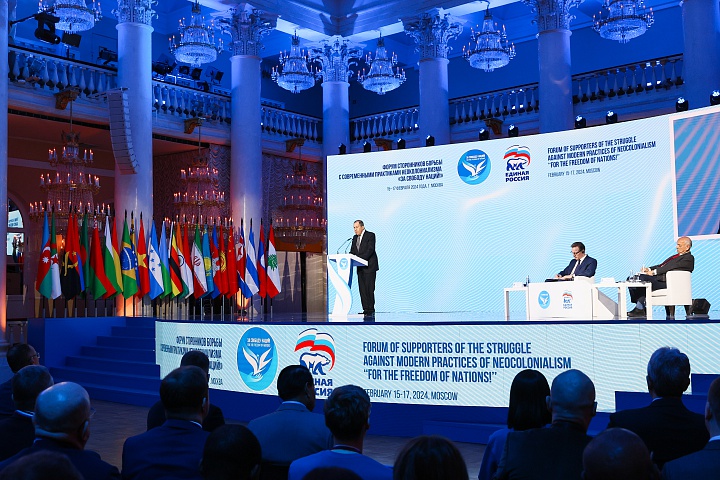
On Friday, February 16, Russian Foreign Minister Sergei Lavrov took part in the Forum of supporters of the fight against modern practices of neo-colonialism – “For the freedom of nations!” organized by the United Russia party. During his speech, the head of the Russian Foreign Ministry voiced many standard theses regarding the West and also called on everyone to unite around the ideas of a “free world” without colonial ambitions.
Lavrov’s key theses:
- “For the last three decades, a model of globalisation has been engineered by the United States and its closest allies, which has proven untenable. Western countries have led humanity not to prosperity but to one of the most acute international crises since the Second World War. The conflict space is expanding worldwide, and a deep split has emerged between the West and the countries of the World Majority.”
- “After the departure of the Soviet Union from the world stage, the West began to impose its “rules-based order,” in essence, its undivided dominance in the economy, finance, politics, and culture. “The Golden Billion enthusiastically took up the neo-colonial development of the post-Soviet space, along with the Global South and East countries.”
- “In the economic sphere, tools such as limiting opportunities for independent development, forcing people to conclude unfair contracts, and pumping out resources at low prices formed on Western stock exchanges were used. Former metropolises often use illegal methods of sanctioning pressure on countries that refuse to submit to dictatorship and sacrifice their sovereignty and national identity.”
- “The American embargo against the heroic Cuban people, sanctions against Venezuela, Iran, Nicaragua and many other countries, including the DPRK, has long become the main foreign policy instrument of the “collective West.” The current generation of politicians in North America and Europe has lost such diplomatic skills as the ability to negotiate.”
- “From another area of neocolonialism – the imposition of neoliberal attitudes to the detriment of traditional spiritual and moral values. Concepts such as gender diversity, drug legalisation and transhumanism are part of these destructive policies.”
- “The current situation in Ukraine is a good example of how desperately the “world hegemon” is fighting to maintain its dominance. Ukraine is a tool in the hands of American puppeteers. Everyone understands perfectly well that the future of the world order is “at stake.” The question being decided in and around Ukraine is whether the world order will become truly fair, democratic and polycentric. Or a narrow group of states will succeed in imposing on the international community a unipolar model, a neo-colonial division of the world into those who consider themselves “exceptional” and the rest – who are assigned to carry out the will of “God’s chosen ones”.
- “Neocolonialism is a dead end. Anyone who follows them is doomed to eternal conflict. Just look at the relationships within the Western camp itself, where some neo-colonialists have already begun to “devour” others.”
- “At one time, our country was a leader in promoting decolonisation processes. The victory in the Great Patriotic War, which came at a huge price, made it possible to stop the global expansion of the West for several decades. In the difficult conditions of the Cold War, the Soviet Union laid the foundation of industry in friendly countries of the Global South and East, helping them ensure their security and realise their rights to sovereign development. And this, not to mention the inspiring example of the USSR, which pushed people’s liberation movements worldwide.”
Outcomes and outlook:
Like the entire Russian leadership, Sergei Lavrov is trying to show that the current policy of the United States and the West is neocolonialism. Russia and China, while opposing Western policies, are also allies of the oppressed states. Promoting the political and economic interests of Russia and China in Africa is the fight against neocolonialism. The war in Ukraine, therefore, according to Lavrov and Putin, is the leading edge of the fight against the colonial system. That is, Russian politicians are already creating a new global mythology, thus justifying their own actions and trying to rally the countries of the “Global South” around themselves.
- Speech by Sergei Lavrov at a conference dedicated to the tenth anniversary of the events in Ukraine
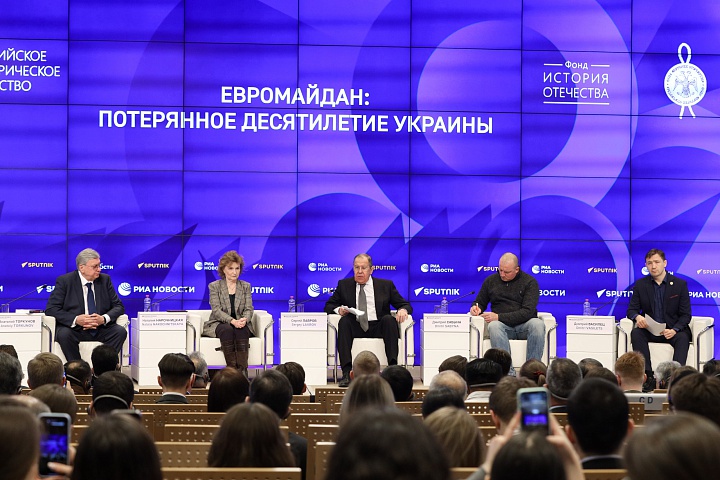
On Friday, February 16, Russian Foreign Minister Sergei Lavrov took part in a conference dedicated to the tenth anniversary of the events on the Kyiv Maidan, which are considered a coup in Russia. The topic of the conference, as expected, was entirely devoted to the Russian position regarding Ukraine, as well as discussions about how relations between Kyiv and Moscow could develop if the Minsk agreements were signed.
Key theses from Lavrov’s speech:
- “If we talk about the geopolitical aspects and consequences of the “coup” in Kyiv, first of all, I would like to say that what is happening is another result of the “divide and conquer” policy, pitting different countries and peoples against each other, provoking interstate conflicts. This policy has long been pursued in different regions of the world by the “collective West” led by the United States, or more correctly, the Anglo-Saxons. The role that England plays in current events is more aggressive and sophisticated in its provocative assertiveness than any other participant, including the United States.”
- “If we talk about the West’s position concerning Russia, then Ukraine has always been considered by them, since gaining independence, as an anti-Russian springboard. In 2004, in fact, the first coup d’etat took place. It was bloodless but unconstitutional. When Viktor Yanukovych won in the second round, the West forced the Constitutional Court of Ukraine to issue a verdict on the need for a third round, which was not provided for by the Constitution. This is how they “wrung their hands.”
- “As a result, a year after the “coup” [2014], in February 2015, agreements of the same name were signed in Minsk. Subsequently, you all know how the then President of Ukraine, Petro Poroshenko, Chancellor of Germany, Merkel, and President of France, Hollande, who signed these agreements with Vladimir Putin, cynically and even proudly declared that they had no intention of fulfilling them. It took time to pump Ukraine up with weapons against Russia. This is a “stunning” confession – a “confession”, in fact. It is a consequence of the fact that the West is using Ukraine in every sense to contain Russia and, as they now say, to inflict a “strategic defeat” on Russia to prevent it from playing the role on the world stage that it is rightfully entitled to.”
- “As a result, Ukraine, which received the richest industrial potential from the USSR and the Russian Empire, turned into the poorest state in Europe, into a territory, without exaggeration, dying out. The Kyiv authorities are already a universally recognised international beggar. There is no independence left for Ukraine.”
- “This is a vivid example of what “flirting” with the West, and a thoughtless desire to integrate into its system of political and economic coordinates in any way leads to. There is no doubt that the West has declared war against us. They don’t hide it. Although they say that they are only arming Ukraine, they say that Ukraine itself is fighting. Everyone understands that this is a lie.”
- “When they lure the countries of the Global South and the Global East to “gatherings” that are organised to promote this “peace formula”, they tell them that they understand that they don’t like it, they understand their position that without Russia anything is pointless to discuss. But they, they say, must support food security and sign up for “one” point. These are “thimbles,” as we say. I don’t know how this translates into English, but it’s an absolute scam.”
Outcomes and outlook:
In fact, Russia has created a rigid system of mythologies in which Ukraine is presented as a victim of a colonial takeover by the United States and the West, a coup d’etat and the establishment of a puppet anti-Russian regime. Russia strives to “liberate” the Ukrainians, defeat the current regime, and restore the “unbreakable friendship of fraternal peoples.” Old historical concepts are being brought into play again. At the same time, the product prepared by Lavrov is intended not so much for consumption in Russia but for partners in the Global South. It is they who explain the origins of the conflict and the reasons for Russia’s actions and lay down the basis of arguments in the event of disputes and discussions with representatives of the “Global West” on the Ukrainian issue.
- Capture of Avdiivka by Russian occupation forces
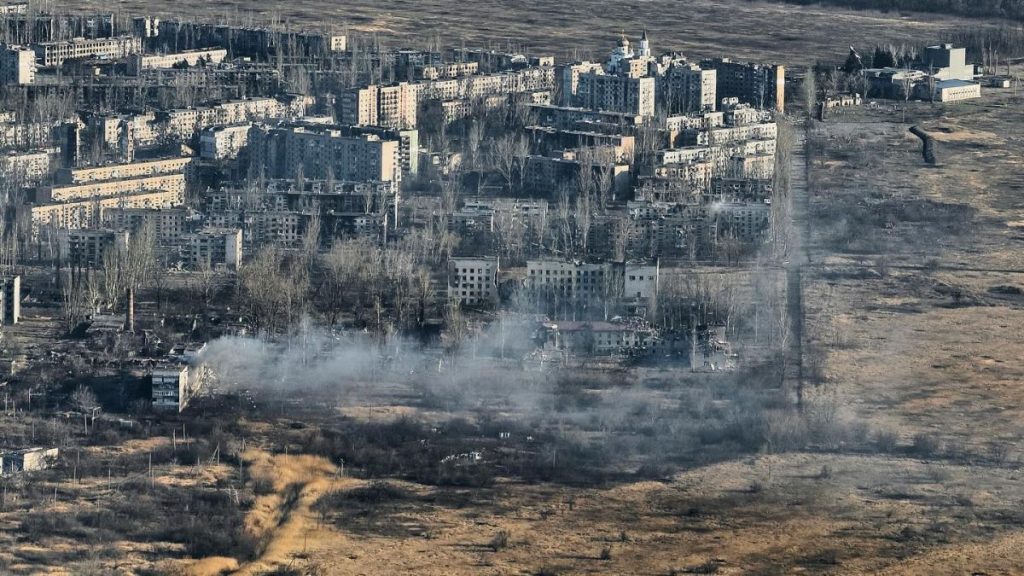
On Saturday, February 17, Russian Defense Minister Sergei Shoigu officially reported to Vladimir Putin about the capture of Avdiivka. The day before, the Ukrainian Armed Forces announced their withdrawal from the city to consolidate in more advantageous positions. At the same time, President of Ukraine Vladimir Zelensky, within the framework of the Munich Security Conference, said that this was done to avoid being surrounded. In addition, he called the decision completely logical and admitted that the Ukrainian Armed Forces have been on the defensive since October last year.
President Zelensky also blamed the withdrawal of the Ukrainian Armed Forces from Avdiivka on the lack of sufficient assistance from the West and an artificial shortage of ammunition.
Outcomes and outlook:
The capture of Avdiivka will be the most notable achievement of Putin’s election campaign. In the coming month, the capture of Avdiivka and the partial success of the Russian army will be shown as a great victory, “a radical turning point in the course of the war.” Russia hopes that by March 17, the US Congress will not make a decision on financing Ukraine, which means there will be no new arms supplies. It will be possible to demonstrate some progress at the front until the very end of the election campaign in the Russian Federation. Avdiivka is, in fact, a vital node, the loss of which has a painful impact on the state of the Armed Forces of Ukraine, but it cannot be said that Avdiivka is already a radical turning point. Avdiivka is the loss of a critical settlement and fortified area on the way to Donetsk, and it also creates a threat to the cities of the north and northwest of the Donetsk region. In parallel, Russian troops, with less haste, attempted to advance in the south – in the area of Verbove and Rabotino in the Zaporizhzhia Oblast. If it is possible to repel the attacks of Russian troops here completely, it means that the Ukrainian Armed Forces were able to concentrate and rebuild.
It is important to note that a new cult has begun to form in the Russian army – the cult of Colonel General Andrei Mordvichev, who is called Putin’s new favourite and for whom they will try to create a new legend. It is quite possible that soon, we will witness new career growth for Mordvichev, who became “famous” for the capture of Mariupol and Avdiivka.

